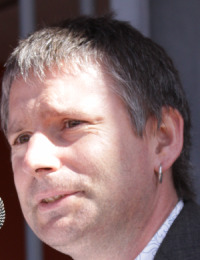From a Covid crisis response towards building a community circular economy in South Africa
Renata Gensicke
VPUU NPC
VPUU NPC
Michael Krause
Violence Prevention through Urban Upgrading NPC
Violence Prevention through Urban Upgrading NPC
Moderation: Dr. Burkhard Hasenpusch
Deutscher Präventionstag
Abstract:
The lock down in South Africa deprived 40% of households of the main source of income. This led to unprecedented levels of hunger (21% of adults, 15% of children). Due to evictions large informal settlements emerged. Crime went up particular in low income areas.
Successful coping mechanisms of a community led response to the Covid-19 crisis in Cape Town are described. A crisis was turned into an opportunity through applied prevention methods, building social cohesion in neighbourhoods, partnering between affluent and low income neighbourhoods, civil society, local, provincial and national government supported by the German Development Cooperation (KfW, GIZ). Clearly defined risk factors turned into an opportunity upon strengthening protective factors with citywide impact. Initial cash transfers to defined risk groups (30.000 households) via a voucher programme, coupled with rebuilding social amenities and WIFI to bridge the digital divide led to a national response in policy changes. Targeted publicly funded work of 50.000 jobs being introduced at national scale. An informal settlement upgrading programme centred around prevention and livelihoods emerges. 3 years of successful partnering are reviewed from crisis response to policy change. Questions of sustainability, capacity and scaling up are discussed. What lessons can be learnt for prevention work in unstable times?
Successful coping mechanisms of a community led response to the Covid-19 crisis in Cape Town are described. A crisis was turned into an opportunity through applied prevention methods, building social cohesion in neighbourhoods, partnering between affluent and low income neighbourhoods, civil society, local, provincial and national government supported by the German Development Cooperation (KfW, GIZ). Clearly defined risk factors turned into an opportunity upon strengthening protective factors with citywide impact. Initial cash transfers to defined risk groups (30.000 households) via a voucher programme, coupled with rebuilding social amenities and WIFI to bridge the digital divide led to a national response in policy changes. Targeted publicly funded work of 50.000 jobs being introduced at national scale. An informal settlement upgrading programme centred around prevention and livelihoods emerges. 3 years of successful partnering are reviewed from crisis response to policy change. Questions of sustainability, capacity and scaling up are discussed. What lessons can be learnt for prevention work in unstable times?
Renata Gensicke
Renata has been trained as an educator and finance manager in the Non for Profit Environment. She has been working in Tanzania, Botswana and South Africa. In South Africa she worked at Hillcrest Aids center in Durban and for the past 15 years as the financial manager at Violence Prevention through Urban Upgrading - a Not for Profit Company that partners with communities in low income areas in South Africa to bring about change towards a safe and sustainable neighbourhoods by shifting the narrative from a culutre of violence to a culture of peace.
Michael Krause

Downloads
Tuesday 13th of June 2023
9:00 - 9:45 am
Room: Mahler Saal II

